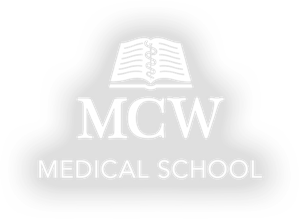MCW-Central Wisconsin Academic Program
The MCW-Central Wisconsin campus features an innovative and focused three-year curriculum, making it possible to complete your medical school experience in three years.

Curriculum
MCW's three-year curriculum is a calendar-efficient program available at MCW-Central Wisconsin, allowing for graduation one year earlier than traditional programs. This is achieved by reducing the number of electives and the length of the traditional medical school breaks, allowing you to graduate and begin working as a physician sooner.
Our MCWfusion Curriculum provides a phased approach for a comprehensive medical education, including doctoring threads paired with practice opportunities that feature clinically applicable and fully integrated basic science teaching. Throughout your medical school experience, you will be engaged in active, small group inquiry-based learning, patient care and healthcare team experiences, and individualized training to become a well-rounded physician ready to practice in a rapidly evolving healthcare environment.

Physician in the Community
Students who train at MCW-Central Wisconsin will become community-engaged physicians.
Your MCW-Central Wisconsin medical education experience will include participation in our Physician in the Community Scholarly Concentration, linking your medical education with the resources of our clinical partners and the needs of the local community to promote health.
In partnership with community mentors, you will identify community needs, collaborate to design and implement a community-engaged scholarly project, and develop a presentation to share your results. These projects are featured yearly in the MCW-Central Wisconsin Student Concentrations Project Showcase.
Learn more about the Physician in the Community Scholarly Concentration

Interprofessional Education (IPE)
You will learn about and participate in various IPE sessions throughout the Curriculum.
You will be introduced to IPE early on and have an opportunity to work in student interdisciplinary teams with various health program students from partnering institutions.
Your IPE experiences will provide you with the tools to identify your own professional role, identify the roles of other professionals, and learn how to effectively collaborate with other health professionals in order to establish mutual respect, dignity, diversity, ethical integrity and trust.
MCW-Central Wisconsin Clinical Experiences
MCW-Central Wisconsin partners with many community physicians and healthcare organizations in the region to provide outstanding clinical experiences for our learners.
Phase 1 Clinical Experience
Students at MCW-Central Wisconsin will need a vehicle to travel to their assigned clinical sites, beginning with one half-day per week in the fall of Phase 1. Clinical sites are within a one-hour travel radius of the campus.
Phase 2 Longitudinal Integrated Clerkship
A Longitudinal Integrated Clerkship (LIC) is a clinical learning model for medical students that combines multiple clinical disciplines into a single experience. This model allows students to follow a panel of patients over time as they move through various healthcare settings, observing the continuum of patient services at all levels of healthcare. Starting in September of the second year, students relocate to their assigned LIC core sites.
Phase 3 Electives and Acting Internships
In Phase 3, Electives and Acting Internship rotations may be scheduled in any order among the set Spiral Weeks, Individual Professional Development and Integrated Science Selectives. Clinical site locations vary based on individual academic plans.
View MCW-Central Wisconsin clinical experiences and rotation sites (PDF)

Other Resources
Library Resources
MCW Student Handbooks & Calendars



